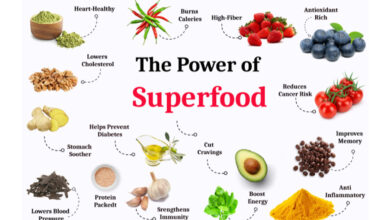
Nutritional Value of Strawberries
Strawberries are not only delicious but also packed with essential nutrients. Here is the approximate nutritional value for a one-cup (about 152 grams) serving of fresh, whole strawberries:
- Calories: 49
- Protein: 1 gram
- Fat: 0.4 grams
- Carbohydrates: 11.7 grams
- Dietary Fiber: 3 grams
- Sugars: 7.4 grams
- Vitamin C: 89.4 milligrams (149% of the Daily Value)
- Manganese: 0.6 milligrams (29% of the Daily Value)
- Folate (Vitamin B9): 40 micrograms (10% of the Daily Value)
- Potassium: 233 milligrams (7% of the Daily Value)
- Vitamin K: 3.2 micrograms (4% of the Daily Value)
Strawberries are also rich in antioxidants, including anthocyanins and quercetin, which contribute to their vibrant color and potential health benefits. Additionally, they are low in calories and provide a good amount of vitamin C, manganese, and dietary fiber.

Here’s a more detailed breakdown of the nutritional content in strawberries per one-cup serving (about 152 grams):
- Calories: 49
- Calories from Fat: 3.6
- Protein: 1 gram
- Fat:
- Total Fat: 0.4 grams
- Saturated Fat: 0.02 grams
- Monounsaturated Fat: 0.08 grams
- Polyunsaturated Fat: 0.2 grams
- Omega-3 Fatty Acids: 14.4 milligrams
- Omega-6 Fatty Acids: 182 milligrams
- Carbohydrates:
- Total Carbohydrates: 11.7 grams
- Dietary Fiber: 3 grams
- Sugars: 7.4 grams
- Starch: 0.2 grams
- Total Carbohydrates: 11.7 grams
- Vitamins:
- Vitamin A: 2.9 micrograms
- Vitamin C: 89.4 milligrams (149% of the Daily Value)
- Vitamin D: 0 international units
- Vitamin E: 0.3 milligrams
- Vitamin K: 3.2 micrograms (4% of the Daily Value)
- Thiamin (Vitamin B1): 0.02 milligrams
- Riboflavin (Vitamin B2): 0.02 milligrams
- Niacin (Vitamin B3): 0.4 milligrams
- Vitamin B6: 0.1 milligrams
- Folate (Vitamin B9): 40 micrograms (10% of the Daily Value)
- Minerals:
- Calcium: 16 milligrams
- Iron: 0.4 milligrams
- Magnesium: 13 milligrams
- Phosphorus: 24 milligrams
- Potassium: 233 milligrams (7% of the Daily Value)
- Sodium: 1 milligram
- Zinc: 0.2 milligrams
- Copper: 0.1 milligrams
- Manganese: 0.6 milligrams (29% of the Daily Value)
- Selenium: 0.4 micrograms
These values are based on a standard reference and can vary slightly depending on factors like the strawberry variety and cultivation conditions.
some additional details on the nutritional components of strawberries:
- Phytonutrients:
- Strawberries are rich in various phytonutrients, including anthocyanins, ellagic acid, quercetin, and kaempferol. These compounds have antioxidant properties and are associated with potential health benefits.
- Fiber:
- Dietary Fiber: 3 grams
- Soluble Fiber: 1 gram
- Insoluble Fiber: 2 grams
- Strawberries contain both soluble and insoluble fiber, which contribute to digestive health and help regulate blood sugar levels.
- Dietary Fiber: 3 grams
- Amino Acids:
- Strawberries contain small amounts of essential amino acids, including leucine, isoleucine, and valine. While not a significant source of protein, they contribute to the overall amino acid profile in the diet.
- Glycemic Index:
- The glycemic index of strawberries is relatively low, meaning they have a minimal impact on blood sugar levels when consumed. This makes them a suitable choice for individuals managing their blood sugar.
- Water Content:
- Strawberries have a high water content, contributing to hydration. About 91% of the weight of strawberries comes from water, making them a refreshing and hydrating snack.
- Health Benefits:
- Regular consumption of strawberries is associated with potential health benefits, including improved heart health, reduced inflammation, and enhanced immune function. The antioxidants in strawberries play a role in protecting cells from oxidative stress.
It’s important to note that the nutritional content can vary based on factors such as ripeness, growing conditions, and cultivation methods. Including a variety of fruits and vegetables in your diet, including strawberries, contributes to a well-rounded and nutritious eating pattern
Let’s delve deeper into some specific nutrients and health benefits associated with strawberries:
- Flavonoids:
- Strawberries are particularly rich in flavonoids, such as anthocyanins, which give them their vibrant red color. Anthocyanins have been linked to cardiovascular health, reduced inflammation, and potential anti-cancer properties.
- Ellagic Acid:
- Ellagic acid is a polyphenol found in strawberries that has antioxidant properties. Some studies suggest that ellagic acid may contribute to protecting the skin from UV damage and supporting skin health.
- Vitamin C:
- A standout feature of strawberries is their exceptionally high vitamin C content. Vitamin C is crucial for collagen synthesis, skin health, and immune function. The antioxidant nature of vitamin C also helps combat oxidative stress.
- Manganese:
- Strawberries are a good source of manganese, an essential trace element. Manganese plays a role in bone formation, blood clotting, and reducing inflammation. It also acts as an antioxidant.
- Anti-Inflammatory Properties:
- The combination of antioxidants, including vitamin C and various phytonutrients, gives strawberries anti-inflammatory properties. Regular consumption may contribute to reducing inflammation in the body.
- Heart Health:
- The fiber, potassium, and anthocyanins in strawberries contribute to heart health. Potassium helps regulate blood pressure, while anthocyanins may help reduce the risk of heart disease by improving cholesterol levels.
- Blood Sugar Regulation:
- Strawberries have a low glycemic index, making them a favorable choice for those looking to manage blood sugar levels. The fiber content also aids in slowing down the digestion of carbohydrates.
- Weight Management:
- With their low calorie and high fiber content, strawberries can be a satisfying and nutritious addition to a weight-conscious diet. The fiber helps promote a feeling of fullness.
Remember, while strawberries offer numerous health benefits, a balanced diet that includes a variety of fruits, vegetables, and other nutrient-rich foods is essential for overall well-being. It’s always a good idea to consult with a healthcare professional or a registered dietitian for personalized dietary advice.
Let’s explore a bit more about strawberries and their nutritional content:
- Hydration:
- Strawberries have a high water content, contributing to hydration. Proper hydration is essential for overall health and well-being, supporting bodily functions such as digestion, circulation, and temperature regulation.
- Vision Health:
- The presence of vitamin C, manganese, and antioxidants in strawberries may contribute to eye health. These nutrients play a role in preventing oxidative stress-related damage to the eyes and may reduce the risk of age-related macular degeneration.
- Collagen Production:
- Vitamin C is crucial for collagen synthesis, a protein that provides structure to the skin, hair, and nails. Including strawberries in your diet can support the maintenance of healthy skin and promote a youthful appearance.
- Anti-Aging Properties:
- The antioxidants in strawberries, including ellagic acid and quercetin, are associated with anti-aging properties. They help combat free radicals, which contribute to premature aging and cellular damage.
- Cognitive Function:
- Some studies suggest that the antioxidants and phytochemicals in strawberries may have neuroprotective effects, potentially supporting cognitive function and reducing the risk of cognitive decline with age.
- Post-Exercise Recovery:
- The anti-inflammatory properties of strawberries, combined with their natural sugars, make them a good choice for post-exercise recovery. They can help reduce inflammation and replenish glycogen stores.
- Iron Absorption:
- While strawberries themselves are not a significant source of iron, the vitamin C they contain can enhance the absorption of non-heme iron from plant-based foods. This makes them a valuable addition to vegetarian and vegan diets.
- Digestive Health:
- The dietary fiber in strawberries supports digestive health by promoting regular bowel movements and preventing constipation. Fiber also contributes to a healthy gut microbiota.
Including strawberries as part of a diverse and balanced diet can provide a range of health benefits. It’s essential to enjoy a variety of fruits and vegetables to ensure that you receive a wide spectrum of nutrients.
Let’s delve even deeper into the various aspects of strawberries:
- Polyphenols and Antioxidants:
- Strawberries are rich in various polyphenols, including flavonoids, ellagic acid, and quercetin. These compounds act as antioxidants, helping to neutralize free radicals in the body. Antioxidants play a crucial role in protecting cells from oxidative stress and reducing the risk of chronic diseases.
- Anti-Inflammatory Effects:
- The anti-inflammatory properties of strawberries, attributed to their polyphenols and vitamin C content, can contribute to reducing inflammation in the body. Chronic inflammation is associated with various health issues, including cardiovascular disease and certain types of cancer.
- Cancer Prevention:
- Some studies suggest that the antioxidants and phytochemicals in strawberries may have potential anti-cancer properties. These compounds may help inhibit the growth of cancer cells and reduce the risk of certain cancers, although more research is needed in this area.
- Folate Content:
- Strawberries contain folate (vitamin B9), an essential nutrient for DNA synthesis and cell division. Adequate folate intake is particularly important during pregnancy to support fetal development and reduce the risk of neural tube defects.
- Low Glycemic Impact:
- Despite containing natural sugars, strawberries have a low glycemic index, meaning they have a minimal impact on blood sugar levels. This makes them a suitable fruit for individuals managing diabetes or those aiming to stabilize blood sugar.
- Organic Acids:
- Strawberries contain various organic acids, including citric acid and malic acid, which contribute to their characteristic tart flavor. These acids not only add to the taste but also play a role in supporting digestion.
- Allergen Potential:
- While rare, some individuals may be allergic to strawberries. Allergic reactions can range from mild symptoms, such as itching or hives, to more severe reactions like difficulty breathing. If you suspect a strawberry allergy, it’s important to seek medical advice.
- Versatility in Culinary Use:
- Strawberries are incredibly versatile in the kitchen. They can be enjoyed fresh, added to salads, blended into smoothies, used in desserts, or even incorporated into savory dishes. Their sweet and slightly tart flavor complements a wide range of culinary creations.
Strawberries are not only delicious but also offer a host of health benefits, making them a delightful and nutritious addition to your diet. As with any food, moderation and variety are key for a well-rounded and balanced nutritional intake.
- Baby names starting with A
- Baby names starting with B
- Baby names starting with C
- Baby names starting with D
- Baby names starting with E
- Baby names starting with F
- Baby names starting with G
- Baby names starting with H
- Baby names starting with I
- Baby names starting with J
- Baby names starting with K
- Baby names starting with L
- Baby names starting with M
- Baby names starting with N
- Baby names starting with O
- Baby names starting with P
- Baby names starting with Q
- Baby names starting with R
- Baby names starting with S
- Baby names starting with T
- Baby names starting with U
- Baby names starting with V
- Baby names starting with W
- Baby names starting with X
- Baby names starting with Y
- Baby names starting with Z















